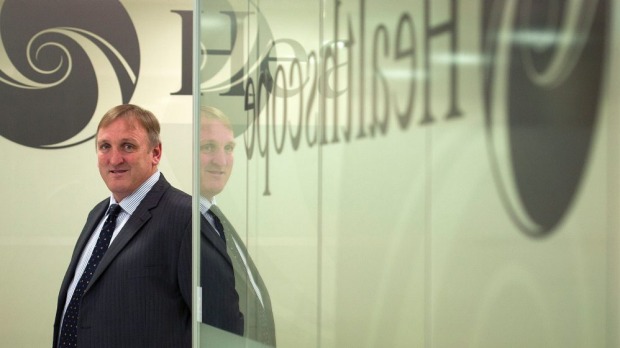
Healthscope chief executive Robert Cooke says he will happily sign Healthscope up to a standard of quality patient care criteria proposed by the government. Photo: Luis Ascui
Healthscope boss Robert Cooke says he will support a government-led intervention in the escalating dispute between Medibank Private and private hospital operator Calvary, which threatens to spill over to other players in the sector.
Medibank, the nation’s biggest private health insurer, wants it written into contracts that if any of a list of 165 “highly preventable adverse events” occur, such as a patient taking a fall while in care, the private hospital should bear the cost.
Mr Cooke said he would happily sign Healthscope up to a standard of quality patient care criteria proposed by the government, as opposed to the standard that Medibank is trying to push on to hospitals.
He said that while he “agrees with what Medibank wants to do”, the insurer’s list missed the mark.
“That list is calling it a mistake when a patient comes in with an infection. That is not a mistake,” Mr Cooke told Fairfax Media.
On a call to investors, where he also discussed the hospital operator’s first full-year profit result after its July 2014 float, Mr Cooke said Medibank’s demands would pressure hospitals to screen patients before admitting them and turn away patients who might become too expensive.
“We can’t do that and I don’t think that’s what Medibank or their patients want,” he said.
The $4.4 billion Healthscope group is Australia’s second-biggest private hospital operator, with 45 private hospitals, including acute, rehabilitation, and mental health hospitals.
Own quality criteria
It already has its own set of quality criteria and a list of 17 “never events” for which it accepts financial responsibility.
“If we left a surgical instrument in or operated on the wrong side, that’s a pretty serious mistake and we shouldn’t get paid,” Mr Cooke said.
“In 2012 we were the first to go and publish 24 quality indicators on our website … I endorse what Medibank is trying to do. I just think it has some flaws.”
Last week Health Minister Sussan Ley said insurers and hospitals should not use “patient welfare as a commodity for trade”, as she announced that a clinician-led review into high-priority complications in hospitals would be fast-tracked.
The review was ordered in 2012 and is being overseen by the national hospital safety regulator. The list was due to be finished in 2016 but it is slated now for December 2015.
“Without even seeing the [government] list, Healthscope would agree to it and more than likely publish it in a public format,” Mr Cooke said.
Medibank moved on Monday to stem criticism it is interested in profit rather than patients by releasing its list of 165 adverse events.
Little chance
Mr Cooke stopped short of attacking Medibank but implied there was little chance of Healthscope agreeing to the insurer’s list.
“The 165 would need a lot of debate and analysis,” he said. “I welcome the minister’s intervention.”
His comments come as Healthscope reported a $153.1 million operating profit in its first full-year result since the company was listed by private equity firms TPG and Carlyle in a $3.6 billion float.
Revenue rose 4 per cent on 2014 to $2.44 billion, slightly down on prospectus forecasts, while operating earnings were slightly ahead of prospectus at $286.9 million.
Healthscope’s hospital business contributed more than 80 per cent of the group’s earnings before interest, tax, depreciation and amortisation and improved margins by 0.8 per cent. Hospitals will be the engine room of growth.
Healthscope plans to deliver 1000 new hospital beds and 50 new operating theatres by the end of the 2017-18 year, as it builds projects such as the Northern Beaches Hospital in Sydney and the Gold Coast Private Hospital in Queensland.
“These hospitals are located in the epicentre of growth in Melbourne, Sydney, and Brisbane. In housing terms, it’s location, location, location,” Mr Cooke said.
He also said Healthscope hoped to sign a joint venture or management contract-style deal in Asia within the next 12 months to drive growth offshore.
“We’ve had several visits into Asia about a pathology or hospital JV … we get calls from China every second day,” he said.
Healthscope shares closed flat on Tuesday at $2.57. The stock is up 13.2 per cent over the past 12 months, compared with an 8.8 per cent fall for the market.
